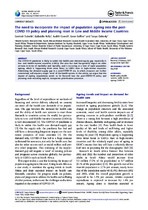| dc.contributor.author | Solanki, Geetesh | |
| dc.contributor.author | Kelly, Gabrielle | |
| dc.contributor.author | Doherty, Tanya | |
| dc.date.accessioned | 2022-02-17T07:32:21Z | |
| dc.date.available | 2022-02-17T07:32:21Z | |
| dc.date.issued | 2021 | |
| dc.identifier.citation | Solanki, G. et al. (2021). The need to incorporate the impact of population ageing into the postCOVID-19 policy and planning reset in low and middle income countries.Global Health Action, 14(1), 1921351. 10.1080/16549716.2021.1921351 | en_US |
| dc.identifier.issn | 1654-9880 | |
| dc.identifier.uri | https://doi.org/10.1080/16549716.2021.1921351 | |
| dc.identifier.uri | http://hdl.handle.net/10566/7274 | |
| dc.description.abstract | The COVID-19 pandemic is likely to widen the health care demand-supply gap, especially in
low- and middle-income countries (LMICs). The virus has had the greatest impact on older
persons in terms of morbidity and mortality, and is occurring at a time of rapid population
ageing, which is happening three times faster in LMICs than in high-income countries.
Addressing the demand-supply gap in a post-COVID-19 era, in which resources are further
constrained, will require a major ‘reset’ of the health system. In this article, we argue that the
impact of ageing populations needs to be factored into the post-COVID-19 policy and
planning reset including explicit, transparent prioritisation processes. | en_US |
| dc.language.iso | en | en_US |
| dc.publisher | Taylor & Francis | en_US |
| dc.subject | Health policy | en_US |
| dc.subject | Health systems | en_US |
| dc.subject | Public health | en_US |
| dc.subject | Covid-19 | en_US |
| dc.subject | Ageing | en_US |
| dc.title | The need to incorporate the impact of population ageing into the postCOVID-19 policy and planning reset in low and middle income countries | en_US |
| dc.type | Article | en_US |

